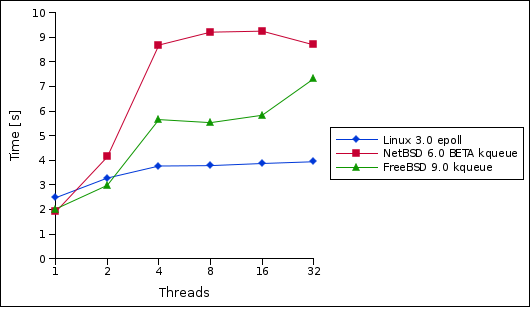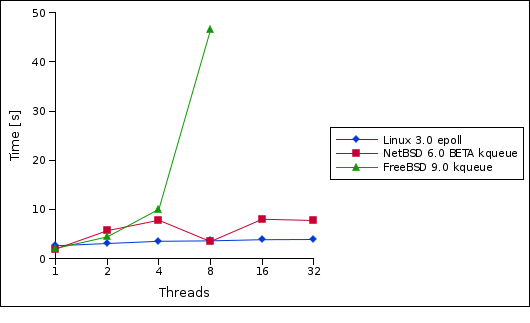home
> blog
>> 744
| [previous] / [up] | [overview] | [down] / [next] |
Tue Mar 27 18:19:40 2012 GMT: Opera 11.62
Sun Mar 25 00:31:10 2012 GMT: Overhead and Scalability of I/O Strategies
Sat Mar 24 23:28:16 2012 GMT: Romeo and Juliet @ Royal Opera House
I have just been to a ballet performance of Romeo and Juliet at the Royal Opera House.
Wed Mar 21 22:08:09 2012 GMT: kevent on FreeBSD (Update)
The kevent multi-threading issue I have seen on FreeBSD seems to be related to the nevents parameter being set to 1. If I pass in something greater than 1 (ie 16), FreeBSD seems to behave much more reasonable. It's still strange, as I only ever expect to get one event (as there is only one packet in transit). Anyway, I have re-run the tests and the results look much nicer now:

(tests were run on my dual-core AMD64 laptop with 400000 iterations - NetBSD and FreeBSD were run inside a KVM virtual machine, so might not be directly comparable).
Sun Mar 18 20:55:50 2012 GMT: Multi-threaded epoll/kqueue
I have been playing with edge-triggered epoll in a multi-threaded context on Linux for some time now, but have now also looked at kqueue on FreeBSD/NetBSD. I have to say that I am only using NetBSD (6.- BETA) and FreeBSD (9.0) in a KVM virtual machine, so that might affect things as well.
Anyway, I have written some simple test programs eptest.cc and kqtest.cc (for Linux and NetBSD/FreeBSD respectively). Essentially, they just create a datagram unix-domain socketpair and send 4-byte packets between them. Note that there is only ever a single packet in transit, so there shouldn't be any contention in user space (and there certainly is no explicit locking in the user space code). But I am creating n worker threads to handle event-triggered notifications when data is available to read on these sockets. So there is certainly some kernel space lock contention.
The interesting thing now is how the run-time changes depending on the number of worker threads on each platform. BTW, I am running this on my dual-core AMD64 laptop.

Interestingly, all platforms perform best with a single worker thread and NetBSD/FreeBSD beat Linux with a single worker thread. But the picture changes dramatically when the number of worker threads is increased. While I am only seeing a slight increase in the run time on Linux, NetBSD varies a lot more and the run time on FreeBSD seems to increase exponetially with the number of worker threads.
But as I said, I am not sure how KVM influences these results - so I am sure there is some more investigation to be done...
Mon Mar 05 23:17:44 2012 GMT: The Dream / Song of the Earth @ Royal Opera House
I have just been to a performance of The Dream / Song of the Earth at the Royal Opera House.
Fri Mar 02 23:00:37 2012 GMT: DNSSEC fully enabled for cmeerw.net
I have just been able to set a Delegation Signer (DS) record for cmeerw.net at the registry (cmeerw.org was already enabled a few months ago). This means that the chain of trust is now complete, see cmeerw.net @ DNSViz and cmeerw.net @ DNSSEC Analyzer.
Fri Mar 02 00:03:53 2012 GMT: Rusalka @ Royal Opera House
Mon Feb 27 21:14:28 2012 GMT: Future Outlook for Eurozone Economy @ London School of Economics
Sat Feb 25 17:17:05 2012 GMT: Photos from Kona, HI
Thu Feb 23 23:17:18 2012 GMT: Don Giovanni @ Royal Opera House
Mon Feb 13 00:16:30 2012 GMT: C++ Standards Committee Meeting in Kona, Hawaii